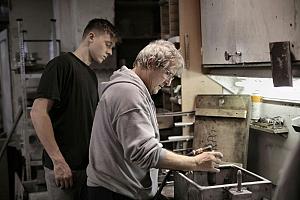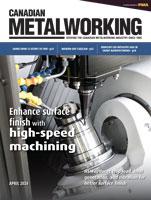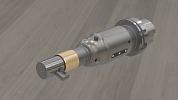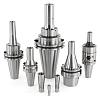Editor
- FMA
- The Fabricator
- FABTECH
- Canadian Metalworking
Manufacturing in the age of COVID-19
Burloak Technologies offers supply chain support in the battle against the novel coronavirus
- By Joe Thompson
- March 30, 2020
- Article
- Health & Safety

Burloak Technologies, which is best known for its work in the aerospace sector, sent an open letter to global manufacturers of respiratory systems and health-care providers offering to help.
COVID-19 has changed the world. Lives are being lost and the disruption to the economy is enormous.
When a call to action was sent out to the manufacturing sector for help, several companies stepped up.
Among them is Burloak Technologies, a division of Samuel, Son & Co. Ltd., which opened a new Additive Manufacturing Centre of Excellence in Oakville, Ont., in 2019.
The facility offers all additive technologies, including laser powder bed fusion, electron beam powder bed, electron beam wire, and directed energy laser fusion. These technologies are combined with a variety of materials and post-production services, including design, engineering, CNC machining, heat treatment, and finishing capabilities.
The company, which is best known for its work in the aerospace sector, sent an open letter to global manufacturers of respiratory systems and health-care providers offering to help.
“We huddled last week and talked about how we as a company could help. We knew we had to balance out a number of things, because if we have people working in the plant, you've got to make that plant as safe as possible,” explained Burloak President Simon Walls. “It also has given our staff a huge lift. The amount of positive commentary we have gotten from people about our offer to help the industry really made us want to step up.”
Team Segregation
The first thing the company did was segregate its workers into three teams: one that works from home and two that work from the facility. The facility teams are further isolated from each other and don’t overlap work hours.
The morning shift works for six hours, including time spent fully sanitizing the plant before the afternoon shift comes in and does its six hours.
“In the event that somebody on one team falls sick, we have a separate team that can come in and do a full eight-hour shift if needed,” said Walls. “It’s meant to give the staff confidence because they know we are paying attention to their health needs and it has reassured some of our customers that we're going to be able to continue to support them.”
Entering the Health-care Supply Chain
In their letter to the health-care supply chain Walls and company Co-founder and Chief Innovation Officer Peter Adams admitted that it’s not their typical type of work, but the facility’s resources are easily transferable. The offer was meant to help ease the burden of the traditional supply chain.
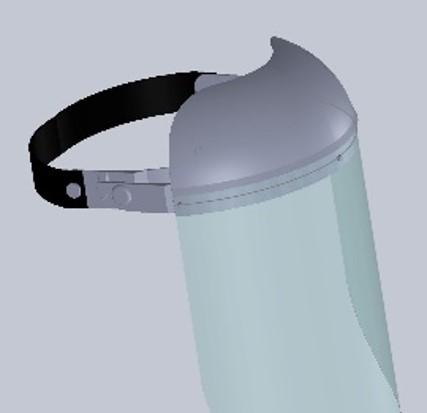
A visor made using additive manufacturing can help protect primary care workers by protecting their N95 mask from being compromised if someone sneezes or coughs right in front of them.
“Everything that you read in the news indicates that supply chains are being strangled right now,” said Walls. “The demand for ventilators and N95 masks is off the charts, and there are multiple stress points along those supply chains.”
How AM Can Help
Most manufacturing processes require that a mould be built before many of these parts can be produced. With additive manufacturing (AM), you don't need this tool, and production can be scaled up more rapidly.
“Tooling [for moulds] can take, depending on the size of the part, weeks or months to create. With additive processes we can go from concept to design to production in days, sometimes hours,” said Walls. “That's the speed at which we can respond to this. No other technology, other than additive, can really offer solutions this quickly. If additive parts are not applicable, tooling development can be accelerated through additive technologies, again breaking down production delays.”
Through one of its service centre businesses, Burloak was made aware of a ventilator part that will be needed in large quantities in a very short time frame. The part, a 2.5-cu.-in. metal component that is normally cast in China, will likely have a demand of 25,000 to 50,000 over the next two months.
Because the supply chain in China can't ramp up quickly enough, Walls thought the part would be a good candidate for AM. The company currently is working through the material science.
How quickly did this come together, though?
“The first conversation was yesterday, and we could potentially be setting up the print by tonight,” said Walls. “Now we can't compete on price with a casting, but we're just wanting to cover our costs. It's not about making a profit right now. It's about supporting the supply chain. This is a higher calling than money, which is actually very, very motivating.”
Protection for Front-line Workers
Another job Burloak currently is working on is a piece of personal protective equipment (PPE) for front-line health-care workers.
A group from Georgia Tech University recently held a Zoom virtual meeting for companies that want to produce items for the health-care sector that may reduce the frequency at which N95 masks need to be replaced.
“What we learned is that if you can put a visor in front of the primary care person, the point-of-care person, it protects their N95 mask from being compromised if someone sneezes or coughs right in front of them,” he said. “Putting a visor in front of them can extend the mask’s life.”
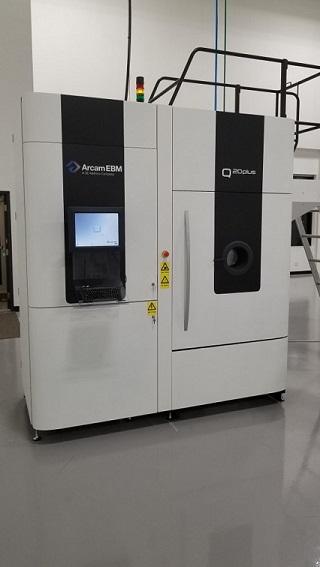
Burloak's morning shift works for six hours, including time spent fully sanitizing the plant before the afternoon shift comes in and does its six hours.
According to Walls, his team has spent a couple of days designing a headset that looks a bit like a welder's mask. It also has a crown on its top to prevent anything from infiltrating behind the mask. The company is working with a local plastic supplier, as well as looking at its own packaging business that produces plastics, to see if they can retool to be able to provide these clear visors.
“I think we can very quickly get to around a thousand parts a day on those pieces,” said Walls.
Whatever the future holds, it will take sacrifice from individuals and companies to ensure that this health crisis is beaten. For manufacturers, it can be a test of what a company can really do with its resources when pushed.
For Walls, it’s also about more than the bottom line right now.
“There’s so much going on right now and so many people trying to support this cause. It's humbling to be part of this and to be able to do something that can help,” he said.
Editor Joe Thompson can be reached at jthompson@canadianmetalworking.com.
Burloak Technologies, www.burloaktech.com
About the Author

Joe Thompson
416-1154 Warden Avenue
Toronto, M1R 0A1 Canada
905-315-8226
Joe Thompson has been covering the Canadian manufacturing sector for more than two decades. He is responsible for the day-to-day editorial direction of the magazine, providing a uniquely Canadian look at the world of metal manufacturing.
An award-winning writer and graduate of the Sheridan College journalism program, he has published articles worldwide in a variety of industries, including manufacturing, pharmaceutical, medical, infrastructure, and entertainment.
subscribe now


Keep up to date with the latest news, events, and technology for all things metal from our pair of monthly magazines written specifically for Canadian manufacturers!
Start Your Free Subscription- Industry Events
MME Winnipeg
- April 30, 2024
- Winnipeg, ON Canada
CTMA Economic Uncertainty: Helping You Navigate Windsor Seminar
- April 30, 2024
- Windsor, ON Canada
CTMA Economic Uncertainty: Helping You Navigate Kitchener Seminar
- May 2, 2024
- Kitchener, ON Canada
Automate 2024
- May 6 - 9, 2024
- Chicago, IL
ANCA Open House
- May 7 - 8, 2024
- Wixom, MI





